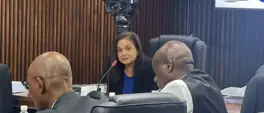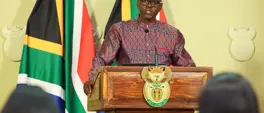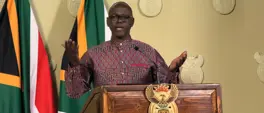Lucky Montana's claims drive SARS to threat of publishing his tax details
Paula Luckhoff
8 October 2025 | 16:47The MK Party MP and former Prasa boss has made claims of fraud against the South African Revenue Service.
- The Money Show
- Stephen Grootes
- South African Revenue Service (SARS)
- Passenger Rail Agency of South Africa (PRASA)

Image of Lucky Montana - Facebook/Parliament of the Republic of South Africa
The South African Revenue Service (SARS) has taken the unusual step of threatening to disclose Lucky Montana's tax information in the wake of his claims of fraud against the agency.
Montana, now an MP for the uMkhonto weSizwe (MK) Party, was implicated in the state capture commission report linked to his tenure as CEO of the Passenger Rail Agency of South Africa (PRASA).
His quarrel with SARS relates to his personal tax affairs.
As reported in the media, Montana claims that he's 'laid criminal charges' against the revenue service for allegedly 'fraudulently doctoring a fake court judgment to justify a hefty tax bill'.
He's further said to have made public claims of 'maladministration, abuse of power and a politically motivated witch hunt', as SARS sums it up in a statement.
While it doesn't normally engage publicly with taxpayers that are engaged in dispute processes, SARS says these false claimsmust be addressed immediately:
"Considering the claims by Mr Montana, SARS will to the extent necessary, invoke Section 67(5) of the Tax Administration Act, which allows SARS to disclose taxpayer information that would otherwise be treated as confidential, in order to disprove the false allegation made against SARS and its processes."
The agency has even before challenged a High Court ruling to unseal former President Jacob Zuma's tax records.
The Act the revenue service refers to, deals in a lot of detail with secrecy and what can be disclosed to whom, says Charles de Wet, tax executive at law firm ENSafrica.
"It says when it is necessary to protect the integrity and reputation of SARS, they can in fact publish confidential details."
The only requirement in these circumstances, de Wet adds, is that the taxpayer in question be given 24 hours notice.
"When the situation has developed to this level and there are false accusations being made, the law did contemplate circumstances like these where they could in fact go to press with as many details as they like."
To listen to ENSafrica's Charles de Wet in conversation with Stephen Grootes on 702's The Money Show, click on the audio link below:
Get the whole picture 💡
Take a look at the topic timeline for all related articles.














